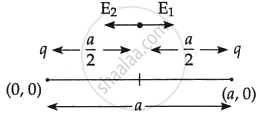Advertisements
Advertisements
प्रश्न
Consider two identical point charges located at points (0, 0) and (a, 0).
Is there a point on the line joining them at which the electric field is zero?
उत्तर

Let at `a/2`:
`E_1 = (Kq)/(a"/"2)^2`
`E_2 = (Kq)/(a"/"2)^2`
The net electric field at a/2:
Enet = E1 - E2
∵ E1 = E2
Enet = 0
at `a/2`
So `a/2` is a point where the electric field is zero.
APPEARS IN
संबंधित प्रश्न
Why must electrostatic field at the surface of a charged conductor be normal to the surface at every point? Give reason?
The bob of a simple pendulum has a mass of 40 g and a positive charge of 4.0 × 10−6 C. It makes 20 oscillations in 45 s. A vertical electric field pointing upward and of magnitude 2.5 × 104 NC−1 is switched on. How much time will it now take to complete 20 oscillations?
The intensity of the electric field at a point at a perpendicular distance ‘r’ from an infinite line charge, having linear charge density ‘λ’ is given by:
An electron falls from rest through a vertical distance h in a uniform and vertically upward directed electric field E. The direction of electric field is now reversed, keeping its magnitude the same. A proton is allowed to fall from rest in it through the same vertical distance h. The time of fall of the electron, in comparison to the time of fall of the proton is ______.
Assertion: On moving a distance two times the initial distance away from an infinitely long straight uniformly charged wire the electric field reduces to one-third of the initial value.
Reason: The electric field is inversely proportional to the distance from an infinitely long straight uniformly charged wire.
Electric field at a point varies as r° for ______.
Two equal point charges of the same sign are fixed on the y-axis, on either side of the origin equidistant from it, with the distance between them d. A third charge moves along the x-axis. The distance of the third charge from either of the two fixed charges when force on the third charge is maximum will be ______ cm.
[d = 10 cm]
Consider two identical point charges located at points (0, 0) and (a, 0).
Is there a point on the line joining them at which the electric potential is zero?
An isolated point charge particle produces an electric field `vecE` at a point 3 m away from it. The distance of the point at which the field is `vecE/4` will be ______.
In case of an infinite line charge, how does intensity of electric field at a point change, if at all, when.
- charge on it is doubled?
- distance of the point is halved?
